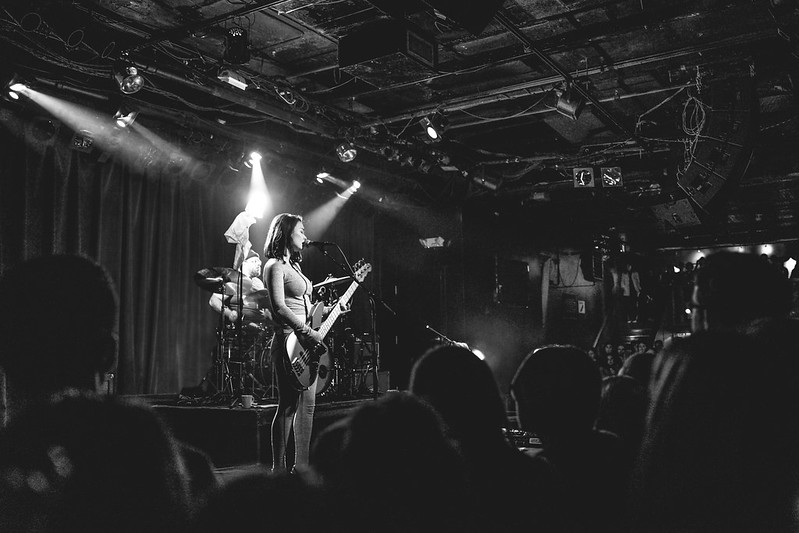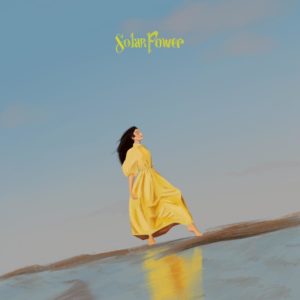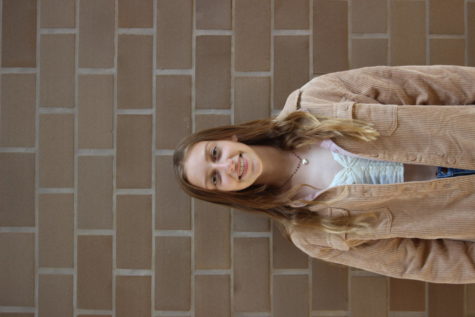Mitski enters a groovy new era with “Laurel Hell”
Kenny Sun
Indie rock icon Mitski Miyawaki has been releasing music since 2012, with Laurel Hell as her most recent album.
March 15, 2022
After telling listeners that she was quitting music indefinitely, Mitski Miyawaki, known by fans as Mitski, revealed a new album: Laurel Hell.
Named after a term used in the Southern Appalachian mountains in the United States, where laurel bushes form wide, dense thickets, “Laurel Hell” refers to the idea of being stuck among the bushes alongside the beautiful laurel flowers that sprout on them, a juxtaposition between the beauty and pain that comes with life.
“How does it feel to be releasing a record again? Terrible. Absolutely terrible, It’s like, ‘Oh Jesus, here we go again. I thought I was having fun and now it’s no fun anymore,” Miyawaki stated in a BBC interview. She grapples with her love-hate relationship to creating music when it comes to producing her songs in “Laurel Hell”.
Despite being known for her sad music, “Laurel Hell” features more upbeat, “dancey” songs, challenging the public’s perception of her art.
On “Valentine, Texas,” the first track on the album, Miyawaki invites her listeners to “step carefully in the dark” with her, convinced that she’ll remember her way around “once we’re in,” an eloquent introduction back into her career in the music industry. Similar to “Last Words of a Shooting Star” and “Pink in the Night,” the song sounds as if she is talking in an empty room, her voice prominent among the quiet instrumentals.
“Working for the Knife” continues a theme of growing up that’s been present in Miyawaki’s discography since 2013, discussing how she always thinks she’ll outgrow her youth by a certain age but never reaches this feeling. Miyawaki uses the metaphor of “the knife” to represent capitalism, emphasizing the focus on growing fame and money in the music industry, through lyrics like “I always thought the choice was mine / and I was right, but I just chose wrong,” As the first single released from her album, “Working for the Knife” holds a tone of defiance and vulnerability.
“Stay Soft” opens with a more cheerful, synth-pop beat. Heavy with sexual innuendo/double entendre, Miyawaki recounts unhealthy relationship in which she feels she is taken advantage of. She sings, “to where the dark remembers you”, connecting to a lyric from “Valentine, Texas,” where she opens the song with, “let’s step carefully in the dark, once we’re in, I’ll remember my way around”. She feels accompanied to the recurring darkness, but it seems to take a different form in “Stay Soft”. She sings of being torn between vulnerability and “hardening up” as a response to her feelings. She references the “gates of hell”, perhaps as a response to the nature of her relationship. Miyawaki’s longing vocals beautifully contrast the upbeat instrumentals and offer endless interpretation to “Stay Soft”.
“Everyone,” the fourth track off the album, plays out in an almost suspenseful way, continuing with the same drum beat throughout the song, with only a brief addition of piano and chimes at the end as it gracefully fades out. Miyawaki continues her reference to “the dark”—likely the music industry—in this song, vulnerable this time as she beckons it, “Take it all, whatever you want,” only to express the naivety she had because she “didn’t know what it would take.” Miyawaki is known for preferring to stay out of the public eye, as she says in a tweet to her fans after the release of “Laurel Hell”, “I make myself unavailable to protect my well-being, but it means I can’t connect with you as before so I’m sending this message to say I’m grateful for all you’ve given,” and to be constantly in a cycle of longing to make music and trying to stay out of the public eye that follows her every move from her clothing to where she lives is a draining process.
“Heat Lightning,” the third single released from the album, is melodic and slow-paced. Miyawaki plays with aspects of nature within her songs and their titles, the names of “Heat Lightning” and “Laurel Hell” being contributed to terms from the American South and Southern Appalachians. Miyawaki sings of giving away to an approaching fear, represented by a storm. She compares the swaying trees of the storm to sea anemones as if she feels submerged by the storm. In a Rolling Stone interview, the singer explained that the R&B-influenced song was an “ode to insomnia”. The dipping instruments contribute to the song’s theme, watching an oncoming storm, waiting to surrender.
“The Only Heartbreaker” is the second single released, and gives a clean approach to an ending romance. In the second verse, Miyawaki sings, “I’ll be the bad guy in this play,” connecting back to “Working for the Knife”, where she sings, “But nobody cared about the stories I had about no good guys”. This contrast shows that now the story centers around the “bad guy”. In an interview with Rolling Stone, she offered more insight to this lyric, saying, “the person always messing up in the relationship, the designated Bad Guy who gets the blame. It could simply be about that, but I also wanted to depict something sadder beneath the surface, that maybe the reason you’re always the one making mistakes is because you’re the only one trying.” The ‘80s element of Miyawaki’s songs from “Laurel Hell” follows through “The Only Heartbreaker”, bringing out the nostalgic tones of her message.
The eighth song of “Laurel Hell”, “There’s Nothing Left for You”, begins with Miyawaki’s melodic singing, gradually rising with a backdrop of beating drums mimicking a beating heart until the instruments explode with the lyric, “You could touch fire, you could fly”. Miyawaki sings calmly and clearly. It’s unclear who the person she’s speaking to is, but it seems as though she’s speaking of how draining their love is, especially in the ending line, “But you’re the only one she’s counting on, there’s nothing left for you”. Miyawaki skillfully crafts scenes within her music that are free to interpretation. In “There’s Nothing Left for You”, her words encourage the listener to put their own meaning to the synth-filled song.
In “It Should’ve Been Me”, Miyawaki describes a relationship in which she was distant and uncommunicative with a partner who tried to hold on to her and find her in other people. She shows her guilt, apologizing for not being there when they needed, saying “when I saw the girl looked just like me / and it broke my heart, the lengths you went to hold me.” Despite the upbeat instrumentals, the song is heartbreaking and lonely as she establishes the fact that the end of this relationship was unexpected — despite thinking that she had put all her effort into the relationship, she was still unavailable to the other person — yet somehow, she still feels “strange serenity”, relieved that her partner has found someone who was able to give them what they needed.
With energetic undertones paired with whispery vocals, “Laurel Hell” embodies Mitski’s journey out of being a “sad girl” and moves onto being more of a pep talk to herself, learning about herself through vulnerability — her escape from the thickets.






